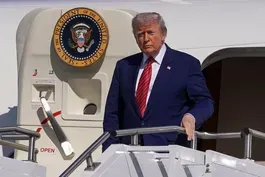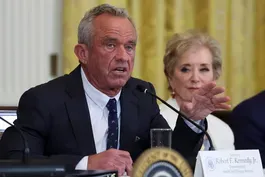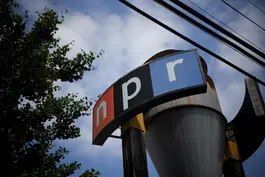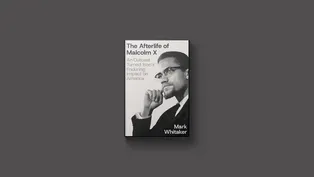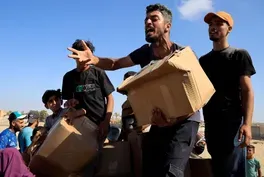
University of the People offers affordable college education
Clip: 5/27/2025 | 8m 58sVideo has Closed Captions
University of the People offers students a new and affordable college experience
The cost of a college education has been under scrutiny amid crippling levels of student debt. That's also true in some cases for online degrees of dubious quality and outcomes. Special correspondent Fred de Sam Lazaro reports on an effort to create an accessible, affordable and global university that's getting attention as an online alternative. It's part of our series, Rethinking College.
Problems with Closed Captions? Closed Captioning Feedback
Problems with Closed Captions? Closed Captioning Feedback
Major corporate funding for the PBS News Hour is provided by BDO, BNSF, Consumer Cellular, American Cruise Lines, and Raymond James. Funding for the PBS NewsHour Weekend is provided by...

University of the People offers affordable college education
Clip: 5/27/2025 | 8m 58sVideo has Closed Captions
The cost of a college education has been under scrutiny amid crippling levels of student debt. That's also true in some cases for online degrees of dubious quality and outcomes. Special correspondent Fred de Sam Lazaro reports on an effort to create an accessible, affordable and global university that's getting attention as an online alternative. It's part of our series, Rethinking College.
Problems with Closed Captions? Closed Captioning Feedback
How to Watch PBS News Hour
PBS News Hour is available to stream on pbs.org and the free PBS App, available on iPhone, Apple TV, Android TV, Android smartphones, Amazon Fire TV, Amazon Fire Tablet, Roku, Samsung Smart TV, and Vizio.
Providing Support for PBS.org
Learn Moreabout PBS online sponsorshipAMNA NAWAZ: The cost and value of a college education have been under scrutiny amid what can be crippling levels of student debt.
That's also been true in some cases for online university degrees of dubious quality and outcomes.
Special correspondent Fred de Sam Lazaro reports on one effort to create an accessible, affordable and global university, one that's getting attention as an online alternative.
It's part of our series Rethinking College.
FRED DE SAM LAZARO: For millions of would-be students just about anywhere in the world, higher education feels out of reach.
CHRIS BURGESS, Student, University of the People: It is very upsetting to see how much college costs.
FRED DE SAM LAZARO: Too expensive or scarce.
MAUNG SAWYEDDOLLAH, Student, University of the People: I was in the refugee camp.
FRED DE SAM LAZARO: Even forbidden.
MALIHA, Graduate Student: I was trying to hide it to keep myself safe.
FRED DE SAM LAZARO: From very different worlds, all three of these young and younger people attend or attended the University of the People, an accredited institution nominally based in California, but fully online, with more than 150,000 students in 200 countries and territories, about 20,000 of them in the U.S. SHAI RESHEF, President, University of the People: We are the best alternative, because there's no other alternative.
FRED DE SAM LAZARO: Shai Reshef founded the nonprofit in 2009, a time when the online education industry was dominated by for-profit schools.
NARRATOR: Technical Institute can help graduates prepare for careers.
FRED DE SAM LAZARO: Several were sanctioned or forced out of business for deceptive advertising and substandard academics that also saddled students with crippling debt.
Shai Reshef himself founded and later sold an international online education firm, one not mired in controversy, he notes.
He says he wanted to use his experience to give back.
SHAI RESHEF: Open-source technology, open educational resources, professors who put their content on the net for the rest of the world to use for free, and the new phenomena where people were willing, and especially professors, to help students with their homework for free.
That's a university.
FRED DE SAM LAZARO: The University of the People is tuition-free, but it's not totally free.
A variety of fees can add up to about $5,000 for a bachelor's degree.
But that, the university says, makes it accessible to millions of prospective students who could not otherwise afford a college education.
And, besides, they have up to 10 years to complete their degree.
MAUNG SAWYEDDOLLAH: The very first time, my impression was, like, just like an online scam, something like that.
FRED DE SAM LAZARO: You thought it was a scam.
MAUNG SAWYEDDOLLAH: Yes.
Hi, everyone.
FRED DE SAM LAZARO: Twenty-two-year-old Maung Sawyeddollah fled Myanmar amid ethnic cleansing campaigns against that country's Rohingya minority.
With his parents and five siblings, he found safety in neighboring Bangladesh, but in a refugee camp, not much more.
MAUNG SAWYEDDOLLAH: Now I'm a student at University of the People students.
FRED DE SAM LAZARO: Like more than half the University of the People students, Maung received a scholarship, though attending was not easy.
MAUNG SAWYEDDOLLAH: I do not have access to Internet in my home, so I needed to go to a top of a mountain.
FRED DE SAM LAZARO: So you had to go up to this higher level to get a signal, basically?
MAUNG SAWYEDDOLLAH: Yes, the Internet connection.
SHAI RESHEF: If we can raise $100 million, we can educate one million students.
FRED DE SAM LAZARO: Reshef has relied largely on philanthropic funding and an occasional surprise, like the $3.8 million Yidan Prize awarded annually in Hong Kong for innovation in education.
But principally, he's counted on volunteers.
SHAI RESHEF: I'm a volunteer.
I did not know how well it would work.
I was shocked.
There is a lot of good will out there.
DALTON CONLEY, Dean of Health Science, University of the People: I wanted to reach a population that I wasn't reaching in my day job, so to speak.
FRED DE SAM LAZARO: Dalton Conley is a professor at Princeton University and leader in the emerging field of social genomics.
Audra Watson works at a civic engagement institute in Princeton, New Jersey.
Both are deans at the University of the People, among some 47,000 academics who volunteer to help students enable otherwise to afford college.
AUDRA WATSON, Dean of Education, University of the People: I went to teachers college, and, at that time, years ago, it was at least 40,000 dollars.
I'm still paying off my student loans.
There are so many people that feel like they can't afford it.
DALTON CONLEY: Students get a great education, but it's a very different experience than going to a brick-and-mortar institution, where you get to have a lot more face-to-face interaction.
FRED DE SAM LAZARO: But offerings are limited, focused on degrees with strong job markets, associate and bachelor's in business administration, computer science and health science, master's in business administration, information technology and education.
SHAI RESHEF: We have a very lean budget, so we give the students everything that is a must for them to have great education, very little beyond that.
So, extracurricular activity, football teams, we don't have all these.
FRED DE SAM LAZARO: Students must pass an entrance exam to assess their readiness.
Classes are taught in English and, for Middle Eastern students, Arabic.
They're small, 20 to 30 students, and demand a 20-hour weekly commitment per course.
It's rigorous, but students can adjust their course load to fit their varied circumstances.
MALIHA: I was in my sixth semester at the university when the Taliban came to power.
FRED DE SAM LAZARO: Twenty-three-old Maliha was studying civil engineering at the University of Kabul, Afghanistan, when everything changed.
MALIHA: The first thing that they did was that they said that women are not allowed to go to schools and universities.
FRED DE SAM LAZARO: To continue their education, she and more than 4,000 other women began studying in secret with the University of the People.
MALIHA: On those dark days that I was at home and couldn't do anything for my future, University of the People was like a light in my darkest days.
SHAI RESHEF: If we have this online education that can reach people wherever they are, we should embrace it and bring the education to them, because they cannot afford higher education.
The U.S. is the best example.
PAUL LEBLANC, Former President, Southern New Hampshire University: Tens of thousands of Americans every year take the GED.
Half of them go on to some kind of post-secondary.
And price is really powerful.
FRED DE SAM LAZARO: Paul LeBlanc recently retired as president of Southern New Hampshire University, a traditional school that has also become a leading provider of online education.
The business has come a long way, he says, with improved academic rigor and standards.
University of the People fills an important void, he says.
PAUL LEBLANC: These are some of the least well-served learners on the globe, and they don't have another choice.
And Shai came up with a model that may not look like a traditional university, but gives them the essential piece of what they need, which is an educational pathway.
CHRIS BURGESS: It's really upsetting to see that education is kept behind a pay wall.
FRED DE SAM LAZARO: Chris Burgess grew up in a poverty-stricken home where survival took priority over education.
Years later, he opened a health food restaurant in Asbury Park, New Jersey, but struggled during and after the pandemic.
CHRIS BURGESS: We weren't receiving results.
We had no way to understand why.
FRED DE SAM LAZARO: Two years into a business administration degree at the University of the People, he says he's already gained insight into who and where exactly his customers are and market accordingly, in doctor's offices treating diabetics, for example.
CHRIS BURGESS: We partnered with local doctors and created specific fliers for them to show them, if your client has bad news, if they can order online.
You just hone in on the people who are actually going to contribute back to the business and create a relationship.
FRED DE SAM LAZARO: And you can track this to your education at the University of the People?
CHRIS BURGESS: A hundred percent.
FRED DE SAM LAZARO: Maliha and Maung Sawyeddollah also credit their University of the People credentials for a huge boost to their aspirations.
Maliha was able to flee Afghanistan last fall and on scholarship now attends graduate school in the U.S.
So does Sawyeddollah, who arrived last August and is now enrolled in a second bachelor's program at New York University.
Both hope to return someday to help bring stability to their distressed homelands.
SHAI RESHEF: I saw that you actually take people and give them their education, their future is totally different.
CEDRIC NETTEY, Graduate: It's a true honor to address this graduating class.
FRED DE SAM LAZARO: His university's degree completion rate is around 25 percent and rising, he says, tracking with online universities overall, lower in part because students, many in difficult circumstances, have up to 10 years to finish.
So far, about 18,000 have graduated, 80 percent of them employed in fields related to their degrees.
For the "PBS News Hour," I'm Fred de Sam Lazaro in New York City.
Calls grow for judges to control their security force
Video has Closed Captions
Clip: 5/27/2025 | 6m 45s | As Trump lashes out against courts, calls grow for judges to control their security force (6m 45s)
A look at Trump's controversial pardons for loyalists
Video has Closed Captions
Clip: 5/27/2025 | 7m 16s | A look at Trump's controversial pardons for political allies and loyalists (7m 16s)
News Wrap: CDC changes COVID shot recommendations
Video has Closed Captions
Clip: 5/27/2025 | 4m 56s | News Wrap: CDC no longer recommends COVID shots for healthy children and pregnant women (4m 56s)
NPR CEO on suing Trump over order targeting funding
Video has Closed Captions
Clip: 5/27/2025 | 7m 3s | NPR CEO discusses suing Trump administration over order targeting funding (7m 3s)
'The Afterlife of Malcolm X' examines his lasting impact
Video has Closed Captions
Clip: 5/27/2025 | 6m 47s | New book 'The Afterlife of Malcolm X' examines his lasting impact on civil rights (6m 47s)
U.S.-backed Gaza aid system quickly overwhelmed
Video has Closed Captions
Clip: 5/27/2025 | 10m 25s | New U.S.-backed aid distribution system in Gaza quickly overwhelmed (10m 25s)
Providing Support for PBS.org
Learn Moreabout PBS online sponsorshipSupport for PBS provided by:
Major corporate funding for the PBS News Hour is provided by BDO, BNSF, Consumer Cellular, American Cruise Lines, and Raymond James. Funding for the PBS NewsHour Weekend is provided by...

